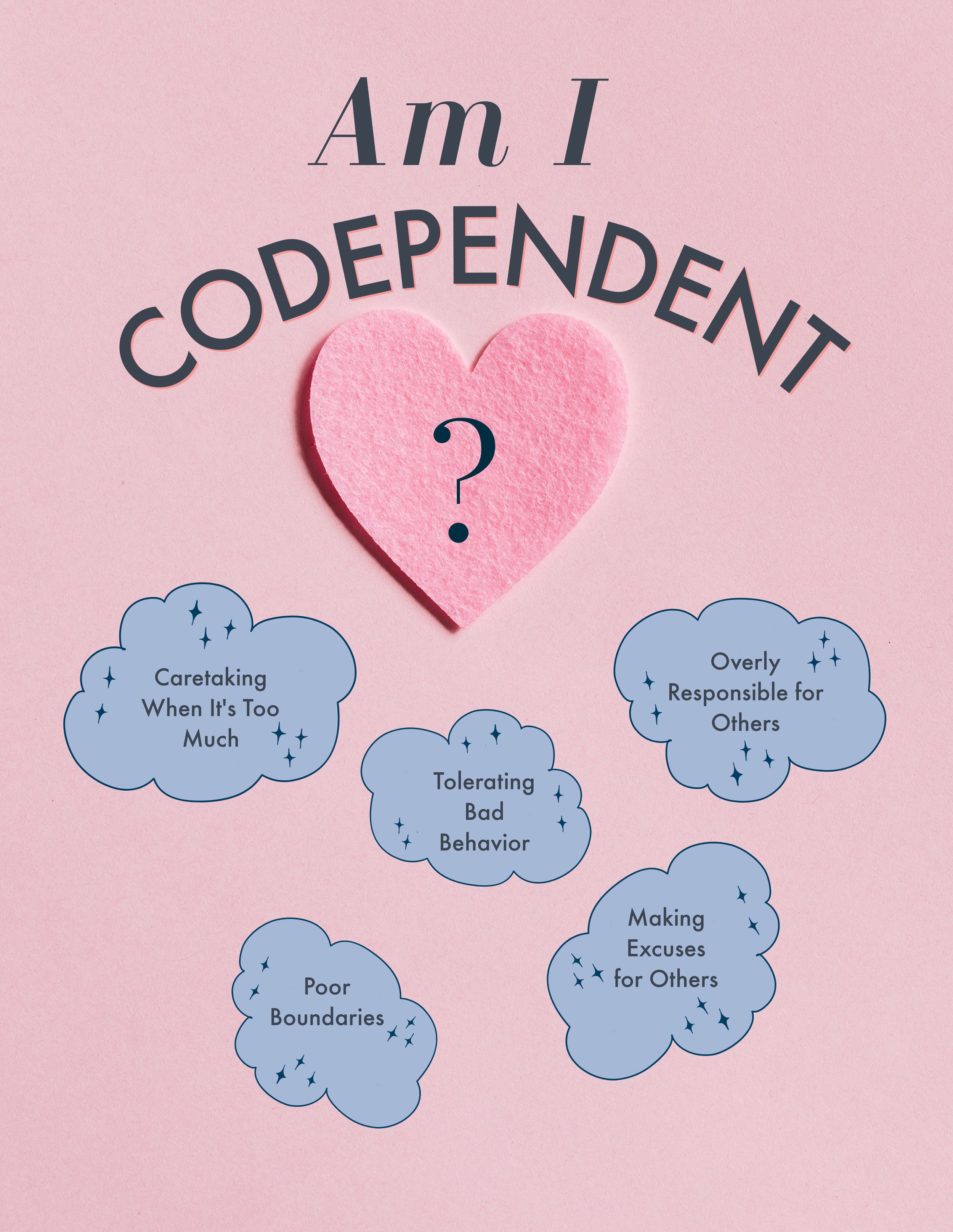5 Possible Signs You’re Codependent (And What To Do About It)
Do you spend valuable time worrying about those around you? Are you wondering why you often feel burned out and overwhelmed thinking about tasks you need to complete to help someone else? Have people given you compliments for being so accommodating? You may be codependent.
Codependency, or people pleasing as it can also be referred to, is basing your own actions on others. It’s about being able to blend in, predict what others’ want, and be of service as a way to protect yourself. People pleasing can derive from childhood for many moms. They learned through experiences (at home, at school, with peers, etc) that being themselves, voicing their opinions or feelings as they were was not a safe way to be in the world. Maybe because of being teased, yelled at or belittled. Maybe a teacher put you on the spot and that experience stuck with you in ways you haven’t thought about in years. Whatever the origin, the unhealed wound typically gets poked at often in motherhood when so many things are being asked and demanded of moms.
Here are some signs that you may be codependent:
1.Caretaking despite it taking over your wellness/time. This one may start off small. You may start by offering to watch your neighbor’s 2-year-old while they go grocery shopping (how sweet!) and over time, it’s morphed into watching that same 2 year old (or perhaps 3, 4, 5 year old by now) every Monday, Wednesday and Friday. What started out as a kind gesture may have been extended or taken advantage of over time. That’s not to put the blame on your neighbor, or friend or sibling. It’s partly on you. Maybe this scenario resonates with you, but maybe you’re a more informal caregiver. This could be being available to take your BFF’s phone calls where she’s complaining about work or venting about her husband while you’re putting off your own to-do list and dropping everything whenever she calls. Whatever this pattern may look like in your life, if you often find yourself with increasing time spent caring for others’ needs at the detriment of your own, then it’s likely a problem.
2. Feeling overly responsible for others (If I just do xyz for them, I know it’ll get done). Have you ever wondered why some people are just not capable of getting things done like you are? Or why does it take some people forever to just clean the bathroom or call the insurance company? So, instead of waiting for them to do it, you do it yourself. Organization is not that person’s strength so you’ll just take care of it. Or maybe you know how stressed they’ve been recently so you’ll go ahead and make that phone call to save them the hassle. I’ve been there. Here’s the issue that can happen: when you start doing things for someone else that they could do for themselves, that’s enabling. If it’s a one time thing, ok, sure. We all need help sometimes. If it’s ongoing, you’ve created a problem of a person who is now relying on you (perhaps subconsciously) so the job you were doing for them will continue to be your job. Codependency is about control, and essentially you’ve taken control of the situation here because frankly, without the sense of control you’d probably be so anxious and uneasy you’d be miserable.
3. Hard time setting boundaries (maybe you start by saying no, and it somehow leads to sure, why not?) It’s a slippery slope. But remember, every time you bend, you give in, you change your mind and go with what the other person wants/needs, you’re making it that much harder. We are habitual creatures and what I mean is that out of habit, the more you do something, the harder it becomes to enact behavior change. Codependent people, or people pleasers, often have extreme difficulty saying no to a request, or setting a limit with someone out of fear of hurting their feelings or being disliked. For some, this is a protective response they take to keep them safe. (I won’t get yelled at by him if I just say yes). Boundaries are something we learn how to set over time. Read more about saying no here.
4. Making excuses for people in your life consistently. Ever made excuses for someone because the truth didn’t sound as compelling? Well, if you’re doing it more often than not there may be something more at play (like codependency). For example, if I’m telling my friend that I can’t hang out with them because my brother is sick and I need to care for him, that sounds a lot more altruistic than “I don’t trust my brother to be in my house without me here because he’s stolen from me before”. I’m not suggesting anything here other than the fact that if you’re lying about it, there’s a reason. An excuse for you might just be a fancy word for “lie”, so if this one hits home for you, ask yourself why are you lying? Who are you protecting more, the other person or yourself?
5. Tolerating behaviors you thought you never would (this may be abuse, this may be doing things/accepting things you typically wouldn’t). Finally, I often work with codependent people who say “I used to think I’d never tolerate that but here I am.” This is not always in the form of physical abuse though it can be. It can also be in the form of emotional abuse, manipulation, lying, or other behaviors you simply would never have put up with. Maybe you’re in a relationship with someone battling addiction and they’ve lied to you repeatedly, they’ve used in your home, they’ve stolen from you, and every time you tell yourself “this is it, I won’t let this happen again” and then it does. And you stay. And nothing changes. And the anger inside you grows. It can feel incredibly painful for folks to imagine their life without that person even when that person being around you is causing you pain. Tolerating behaviors (whatever they may be, whatever is intolerable to you) that don’t align with your values leaves you feeling disappointed, guilty, sad, anxious, angry and resentful. This may be a sign that you’re codependent, and even more, a sign you need help.
If any (or all) of these sound like you, consider what you may be getting out of staying in these relationships. How does being codependent, people pleasing, serve you? Does it keep you safe? Does it keep you from being alone which sounds utterly horrible? However these behaviors listed above may be serving you, the sooner you start to explore it, the sooner you’ll be free. Schedule a free 30 minute call with me today and start putting your needs as a priority.
If you or someone you know is in an abusive relationship (or even if you’re not sure, and you'd like someone to chat with about it), call the National Domestic Violence Hotline at 800-799-7233 or text START to 88788.


